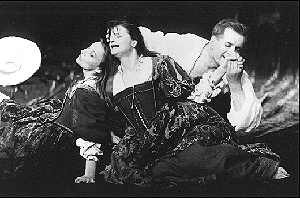|
|
|
監督・脚本・編集・録音:フレデリック・ワイズマン
Director, Script, Editing, Sound : Frederick Wiseman |
1930年ボストン生まれ。ダイレクト・シネマ最盛期の1967年、精神病院刑務所に取材した『Titicut Follies』で監督デビュー。同作品は90年代初頭まで上映禁止となったが、ワイズマンは以来、ほぼ年に1本のペースで着実に作品を発表している。一貫したテーマはアメリカ社会の施設・組織の日常生活で、学校(『High School』(1968)『High School II』(1994))、病院(『Hospital』(1969) 『Near Death』(1989))、警察(『Law and Order』(1969))、軍隊(『Manoeuvre』(1979) 『Missile』(1987))、劇団(『Ballet』(1995)) などを扱ってきた。本映画祭では、1991年に『モデル』(1980)を招待上映、1993年に『動物園』(1993)がコンペティション部門最優秀賞を受賞。 Born in Boston in 1930. Made his directorial debut in 1967 during the height of direct cinema with Titicut Follies, a film about a facility for the criminally insane. Although this work was banned until the early 90s, Wiseman continued to consistently produce around one film a year. High School (1968), Law and Order (1969), Hospital (1969), Manoeuvre (1979), Missile (1987), Near Death (1989), High School II (1994), Ballet (1995) all explore the theme of daily routine in American institutions. Model (1980) was shown in the invitational section of the YIDFF 91 and Zoo(1993) won the YIDFF 93 Mayor's Prize in the Competition section. |
 |
|
|
社会の鍵としての閉じられた組織や環境などをいつも対象にして、ナレーションも音楽もなく、カメラで追いつづけるワイズマン・スタイル。今回の対象はフランスのコメディー・フランセーズである。舞台のリハーサル風景、演出家や俳優たちの表情、舞台装置や衣装など裏方の準備、経営委員会など、フランス演劇を代表する劇団の全貌が描かれる。 この作品によって、これまでみずからの文化や言語に精通した環境にこだわってきた監督は、初めて異文化の対象にカメラを向けた。しかも、コメディー・フランセーズという閉じられた環境がフランス社会を写す鏡とはいえ、そこはまた演劇という表現の場でもある。マリヴォーの「二重の不実」やモリエールの「ドン・ジュアン」などの舞台とそれに向けられたカメラ。この作品は演じることと演じられることをとらえながら、舞台と映画という二重性のなかに分け入っていく。ワイズマン・スタイルにとっても興味深い作品といえる。 |
No voice-over narration, no extra-diegetic music, the object of
study is always an institution or closed organization which acts
as a mirror of society--that is Wiseman's style. This time his
subject is France's Com仕ie-Fran溝ise. A full picture of France's
premier theatrical troupe is presented: the on-stage rehearsals,
the expressions of directors and performers, stagehands preparing
scenery and costumes, the administrative committee, etc. This
is the first time Wiseman, who until now has restricted himself
to circumstances in which his own language and culture prevail,
has pointed his camera at a subject from another culture. The
closed world of Com仕ie-Fran溝ise may be a mirror of society,
but it is also theater. The camera can also be turned on the stage
to show Marivaux's La double inconstance and Moli? re's Dom Juan. While capturing both performance and what is being performed,
this work begins to penetrate the dual quality of stage and film.
It may be said, then, that this piece is deeply interesting with
regard to Wiseman's style. - Murayama Kyoichiro |
|
|
|
|
監督のことば 『コメディー・フランセーズ―演じられた愛』は世界で最も古い劇団のひとつの仕事をドキュメントした映画である。私の他の映画では、私は職業上の役柄を演ずる人々に興味をひかれてきた―政治家、医師、看護婦、軍人、教師、弁護士、裁判官、監獄の看守、モデル、それに普通の市民、といった役柄である。今回偉大なる俳優たちの仕事を研究する機会を得たことは、私にとってどんな役でも演じられる能力をもった人々を見られるということだった。この映画は愛のさまざまな様相の表現にそって構成されている―ラシーヌにおいては悲劇(「ラ・テバイード」)、フェイドーにおいては笑劇(「アメリーを頼む」)、マリヴォーにおいては合理的(「二重の不実」)、そしてモリエールにおいては心を操る手段として(「ドン・ジュアン」)。 また、この映画は現代のフランスでの生活とマスコミで話題になっている事との関係を示唆し、コメディー・フランセーズをフランス文化の伝統的側面の幾つかを反映する組織として検証してもいる。それは過去に根ざしながら、同時に現代的なものでもある。 |
Director's Statement La Com仕ie-Fran溝ise ou l'amour jou? is a film that documents the work of one of the oldest theatrical companies in the world. In my other films I have been interested in the way people play professional roles as politicians, doctors, nurses, soldiers, teachers, lawyers, judges, prison guards, models, and the roles of ordinary citizens. This opportunity to study the work of great actors enabled me to look at people who have the capability to play any role. The film is organized around the presentation of different aspects of love--tragic in Racine (La Th暫a錨e), farce in Feydeau (Occupe-toi d'Am四ie), rational in Marivaux (La double inconstance), and manipulative in Moli? re (Dom Juan). Also, the film suggests the relationship between life in contemporary France and issues treated in the press, and it examines the Com仕ie-Fran溝ise as an institution that reflects certain traditional aspects of French life which are both rooted in the past and contemporary. |
